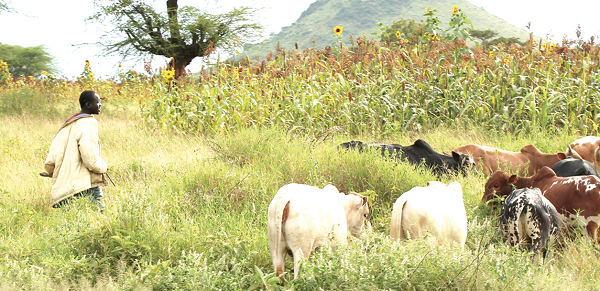
Cattle grazing and the consequences thereof
Why should it get to killing of innocent Ghanaian farmers, raping of farmers’ wives and children and wanton destruction of people's livelihoods, all in the name of finding pasture? Nomads are persons who have no settlements and move from place to place, usually alongside their livestock in search of good pasture and water.
In prehistoric times, such persons roamed the whole world until various civilisations put up rules and regulations governing the keeping of livestock.
Advertisement
In many jurisdictions, if you do not own land, you do not keep animals. It meant that pasture was produced on the land for the livestock to feed in enclosures. One of my best sights in the United Kingdom was seeing cattle, sheep and goats on grazing land with low wooden fences or hedges demarcating paddocks. Maybe because where I came from, we cohabited with big and small animals and got frightened when a cow was in motion. Literally, a cow on the run was referred to as a mad cow and everybody took cover.
It meant that anybody without land did not keep animals or you made arrangements with a landowner and kept your animals on his/her land. Since necessity has always been the mother of invention and weather conditions are such that the animals cannot be outside eating pasture all year round, fodder is grown, bailed and stored in bans for the winter months. To see the British countryside all green from pasture cultivation, the drying of the fodder and the bailing were impressive. It really was a sight to behold and many a summer days, I spent time visiting farms and watching the processes to ensure that animals were kept in enclosures and duly fed. In Ghana, those who keep animals in enclosures are either in rooms in houses cohabiting with humans or are along the Nima highway in Accra or in obscure areas around the various big gutters that traverse Accra's geography or wherever it is in Ghana that the animals are kept. This excludes those that are kept in enclosures awaiting slaughter at the various slaughter houses or abattoirs.
Lesson
As a result of the decision to allow only persons with land to hold livestock, a potentially serious problem has been averted in those countries. A similar law can be instituted in Ghana. Land banks can be generated in every district through collaboration among landowners, traditional authorities and district assemblies. Boreholes can be sunk and wooden fences provided. Pasture can be grown, cut and brought in to supplement what is within the enclosure. All cattle and ruminant owners can pay a holding fee which will cater for land rental and feeding. This way, we will not need persons to be accompanying cattle and traversing land in search of pasture and water.
The only reason why Fulani people are used to look after cattle is because as nomads, they are used to trekking long distances. It is not because they can speak the language of the cows. That is a fallacy we have all been made to believe. After all, there are no Fulanis looking after cattle in Britain or in anyplace where the proper structures have been put in place. Interestingly in those areas, animal right activists will not countenance walking cattle for hours on end in search of food. Is it any wonder our cattle are thin and feeble compared to those in areas where they conserve their energy? One has only to look at local cow foot and ox tail compared to the imported variety.
Do lives matter?
We have brought the present hardships in Agogo, Kwahu, Begoro and other places on ourselves, of course, with the complicity of men in political power, traditional authority and the security agencies. They either have their cattle among those causing the mess and do not know where to keep them or are looked after by the Fulanis. They have a ready penchant to bribe their way through every difficulty and with willing hands, get away with anything. Do Ghanaian lives matter? I dare to ask. If so, then why will Ghanaians be arrested when cows are killed but no one gets arrested when Ghanaians are killed or farms are destroyed. There will be no need for Fulanis if all cattle are kept in enclosures.
Ghana has pasture throughout the year. We could trade in it and send truck loads of fodder to Sankasi (Togo), Burkina, Niger and Mali, but then the problem of water for the livestock may be an issue. The solution is fenced land for keeping livestock backed by law and enforced. It will make the Ghanaian countryside picturesque.
In the first republic, Fulanis who brought cattle were identified and the number of cows noted. Very few individual Ghanaians had cattle like today, other than families in the North which took care of their own. Each Fulani on arrival was given a specific period of sojourn, after which you went back but sold half of your cattle to the Government of Ghana. It was the meat used for the Zuarungu meat factory. Cattle in Ghana, because of good pasture have calves every year. In the landlocked countries, it may be two or three years before cattle bring forth. There was, therefore, the need for Ghana to benefit from its benevolence. Can we do that now? Why not! Let us act now and stop pussyfooting with what can potentially boil over and make some districts no-go areas. Some communities have already become ghost towns. A stitch in time saves nine.




